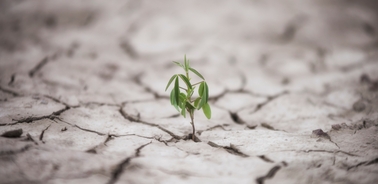Embracing resilience: developing a growth mindset

When things don't go as planned or life’s responsibilities pile up, do you feel like the walls are closing in around you? Or do you bounce back quickly in the face of adversity?
If you struggle to cope every time life throws hardship your way, you may be lacking resilience. A recent study on coping strategies and their effect on mental health defined resilience as “the ability to persist, grow, be strong, and even succeed in life, despite adversity.”
The key to being resilient lies in taking responsibility for your own well-being rather than letting circumstances dictate. Highly resilient people bounce back quickly, even in chaotic and challenging conditions. They also seek the positives in situations, rather than letting matters that are out of their control define their state of mind.
Being resilient doesn’t mean you’re invincible; resilient people still feel the pain that comes with challenging times. A key difference is that they don't wallow in negative feelings or stress, or let it stop them from moving on or leading a healthy life. Additionally, they see setbacks as learning experiences and opportunities for further growth.
Resilience: an essential part of our mental health
Those of us who lack resilience can feel hopeless or overwhelmed in the face of challenges, even the fairly mundane ones that most people face at some point. Scientists at the Mayo Clinic have recently discovered that building resilience is a key aspect of thriving as a healthy and capable individual who can tackle obstacles—no matter how big or small.
In recent years, the connection between mental health and resilience has been a regular topic among researchers. Studies at Harvard University show that higher resilience is associated with increased longevity and a positive outlook on life. Focusing on things that are going well and making the most of our social network can both help to build our resilience. It’s a characteristic that can influence our overall mental health, not just our ability to overcome challenges.
Other studies have found that resilience acts as a protective layer against the development of mental health conditions like PTSD, anxiety, and depression. A greater ability to recover from trauma, stress, and anxious tendencies can help people overcome difficulties instead of feeling consumed by them.
Nature or nurture?
Apart from reducing the risk of mental health disorders, resilience can improve your overall well-being and mental health by encouraging a positive outlook on life and the challenges that come with it. Moreover, resilient individuals possess a greater sense of self-worth because they see themselves as capable of thriving even in adverse conditions.
Developing a Growth Mindset
Closely intertwined with resilience is the development of a growth mindset. As defined by Stanford University psychologist Carol Dweck, a growth mindset is the belief that a person’s capacities and talents can be improved over time. This contrasts with a fixed mindset, which contends that the capacity to learn and improve is unchangeable.
People who cultivate a growth mindset are more likely to enjoy the freedom to reach their full potential, keeping their lives and careers aligned with both their personal objectives and their core values. Doing so begins with believing you can achieve your goals, rather than blaming other people or circumstances for your shortcomings. When confronted with something difficult, don’t give up; instead, try to see it as a chance to learn.
By building a growth mindset you’re not only setting yourself up for greater success in achieving your goals—you’ll also face challenges in a different, more intentional way, and that in turn makes you more resilient. The two go hand in hand. Research on resilience suggests that people who demonstrate a growth mindset, believing they can learn from mistakes and improve their skills, also develop more resilience. Resilience is a quality that can be learned and strengthened throughout your lifetime.
Our ability to manage failure is a key example of how having a growth mindset can help us to become more resilient. It can be difficult to reframe failure and learn from it, as we tend to see failures as an injury to our ego. But it is a skill worth learning: an inability to learn from failure has been shown to reduce the odds of future success.
Learning to reframe failure is an important part of viewing challenges more consciously and emerging more resilient. We can’t go through life without experiencing failure; what we can do is try to use it as a way to make our future selves wiser and more confident.
Day-to-day resilience builders
The way we live our everyday lives can also have an impact on our resilience. Building healthy relationships with friends, family, and peers can provide an outlet for stress and anxiety and act as a support system. So, too, can exercise, a healthy diet, and making time for hobbies and interests.
Mindfulness has been shown to be one of the best practices for cultivating resilience. Through meditation and other mindfulness activities, we have the opportunity to observe our thoughts without judgment or reaction and to stay grounded in the present moment. Over time, this builds our ability to be more flexible and adapt, thus contributing to a higher level of resilience and greater overall well-being.
This in turn makes us better placed to change the narrative on negative experiences, which is another way we can strengthen our resilience. Without realizing it, the stories that we tell ourselves directly contribute to our mental well-being and our ability to deal with challenges and suffering. We’re often our own worst critics, so by trying to engage in more positive self-talk—such as using positive affirmations daily—and looking for the potential upsides of a bad situation rather than only seeing the negatives, over time we can become more resilient and optimistic.
Resilience is a muscle that needs to be trained. We can achieve this by facing our fears and emotions, stepping outside our comfort zones, and developing authentic confidence. Avoidance is the antithesis of building resilience. As Michelle Obama once said, “Failure is an important part of your growth and developing resilience. Don't be afraid to fail.”
To truly understand the value of resilience and growth, it’s important to experience failure intentionally. Try engaging in a failure practice, take on challenges where success isn’t guaranteed. This exercise helps you recognize that setbacks are not signs of weakness, but opportunities to learn and adapt.
In much the same way as fears and phobias can be treated with gradual exposure therapy, we can take small steps every day to become more resilient. Having a strong sense of purpose, observing our thoughts dispassionately, and learning to be comfortable with failure are ways in which we can build and maintain the authentic confidence that is the bedrock of resilience.

